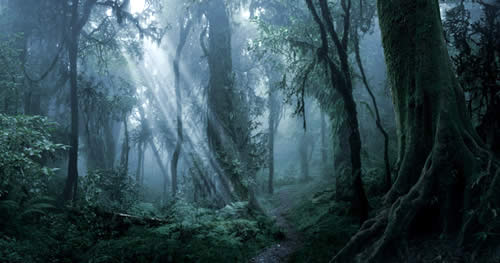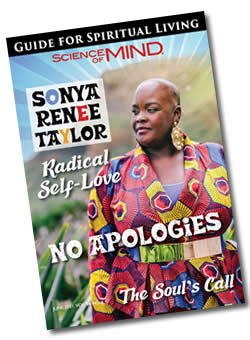 |
|
||
 |
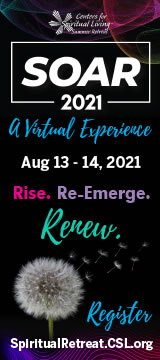 ...more |
 |
 ...more |
 |
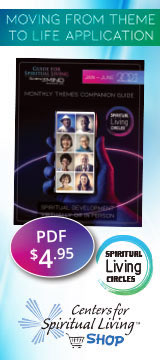 ...more |
 |
Our Clarion Call for Freedom
Celebrating Juneteenth in 2021 is a bit of a paradox, Rev. Andriette Earl and Rev. Dr. Raymont Anderson write in the June 2021 issue of Science of Mind magazine. They make the comparison to what Frederick Douglass expressed in his July 4, 1852, address entitled, “What, to the Slave, Is the Fourth of July?” The question they pose about Juneteenth is what, exactly, are we celebrating? Juneteenth commemorates a specific order, issued in Galveston, Texas, on June 19, 1865, by U.S. Maj. Gen. Gordon Granger. The order said, “The people of Texas are informed that, in accordance with a proclamation from the Executive of the United States, all slaves are free.” “Juneteenth 2021 is the passing of the torch,” Earl and Anderson write, “the illumination of our aspirational potential and the infinite possibilities available to us. It is our realization of the importance of excavating our unique and complex story and sharing our authentic and perplexing history — boldly and transparently. We know that all are individual incarnations of Spirit. Knowing that calls us to ensure all be truly free, fed, clothed, nurtured, empowered and connected in a system of justice and equity.” So what is there to celebrate? “Juneteenth 2021 can be our empowered acknowledgement and celebration of our ever-expanding awareness of freedom as spiritual principle,” they add. This year we can design our celebrations to assist us in clarifying our personal intention and to renew our commitment to liberty and justice for all. Our philosophy honors freedom as Divine Principle — a God-given right for all. They conclude: “We must live this with the understanding that I am not my brother ’s keeper — rather, I am my brother, I am my sister, I am my gender-rich sibling. Rugged individualism might seduce us into focusing solely on the individual while ignoring the work needed to emancipate all — everyone — from every discord of every nature.” Emma Lazarus, who inspires us to lift our lamp beside the golden door, reminds us, “Until we are all free, we are none of us free.” This Juneteenth, “a world that works for all” is our clarion call to freedom. |
||||||||||
|
Honoring Freedom:A Juneteenth Weekend SymposiumErnest Holmes wrote, “The Divine Plan is one of freedom; bondage is not God-ordained. Freedom is the birthright of every living soul.” If you want to expand your experience of spiritual freedom, join Honoring Freedom and CSL June 18-19 for an online symposium focused on the meaning of Juneteenth and the spiritual principle of freedom. Cohosts Tracy Brown and Rev. Celeste Frazier offer inspiring speakers, uplifting music and affirming spiritual practices. Register today at Honoring Freedom! |
||||||||||
Activate the Power of Mindfulness
By Rev. Dr. David Ault A mystery carries with it a need for solving. It stimulates our sense of imagination, entices a thrill around solving the unsolvable and reveals critical insights. A mystery in spiritual terms is something to be savored, a limitless container where faith and grace await. Holmes taught that it isn ’t enough for us to hope. It isn ’t enough for us to believe. We must cultivate a knowing. Yet how do we cultivate a knowing in the realm of spiritual mystery? I start with considering that a solution already exists. When viewing all circumstance through a hybrid lens, then everything is real in regard to this singular plane of existence and, simultaneously, everything is mirage through the lens of multi-dimensionality. Human challenges are real during the secular dance with a body, but am I willing to carry a hybrid awareness that the only reality is God? That ’s what faith is. We can behold a spiritual mystery that everything is not as it seems. This hybrid of heaven/earth realities becomes easier to amalgamate the more we practice. If we can face a human problem but also welcome the possibility that perfection exists beyond the problem, then we savor the mystery along with cultivating the knowing Holmes urged. … Spiritual mystery allows us to cease the insanity of trying to apply one-dimensional answers to our multi-dimensional experience. As theologian Frederick Buechner said, “In the last analysis, all moments are key moments, and life itself is grace.” — Daily Guide for June 8, 2021, as published in the June 2021 Science of Mind magazine |
||||||||||
Thought Is Creative
By Ernest Holmes The only permanent thing there is is change, and yet with all of this variation, this accumulation and advance we call evolution, we notice that the eternal principles never vary…. What changes is the action; what remains is the principle. That principle is what we mean when we use the words I Am. I Am is both universal and individual — universal as an abstraction, individual as a concretion…. Thought is creative, and the more emotional the thought, the more creative it is. It is not creative because we contemplated and meditated and prayed and fasted. Our thought is creative because that is its nature. Our nature is God, and the nature of God does not change. No matter where you discover It, the only God you can ever know is the God you uncover in yourself, because no man can ever know anything outside of the intelligence within him whereby he knows anything. Then the only God he can know is through the intelligence of himself…. No one of us probably will step full-orbed from bondage into freedom, but each one of us, within a year, may be experiencing so much more freedom and happiness and prosperity than we do today that it will be like the new heaven and new Earth, if we comply with the Law…. We cannot reverse the natural process and order of Nature; we cannot neutralize the laws of God. All we can do is to place ourselves in a different position toward them. — Excerpted from the January 1939 Science of Mind magazine article, “The Power of the I Am Presence,” by Ernest Holmes. |
||||||||||
|
||||||||||
|
||||||||||
| ||||||||||
 |
 ...more |
 |
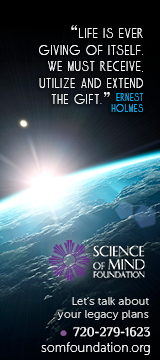 ...more |
 |
 ...more |
 |



